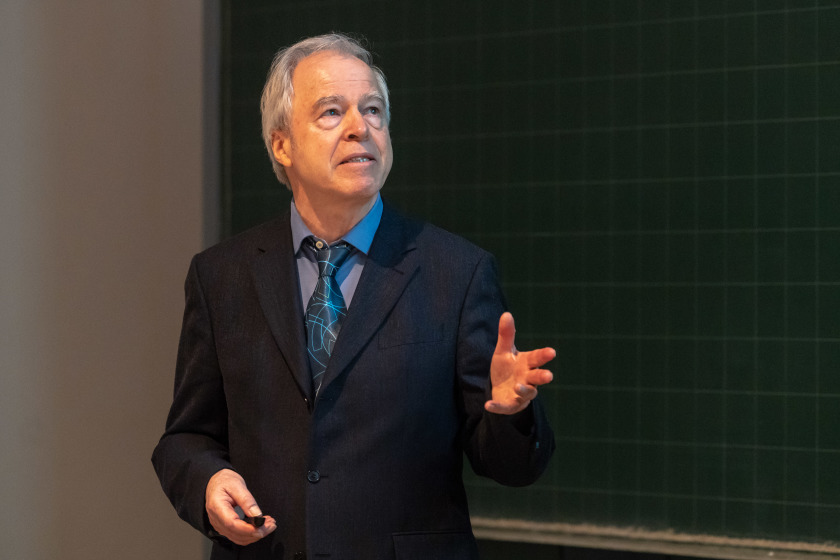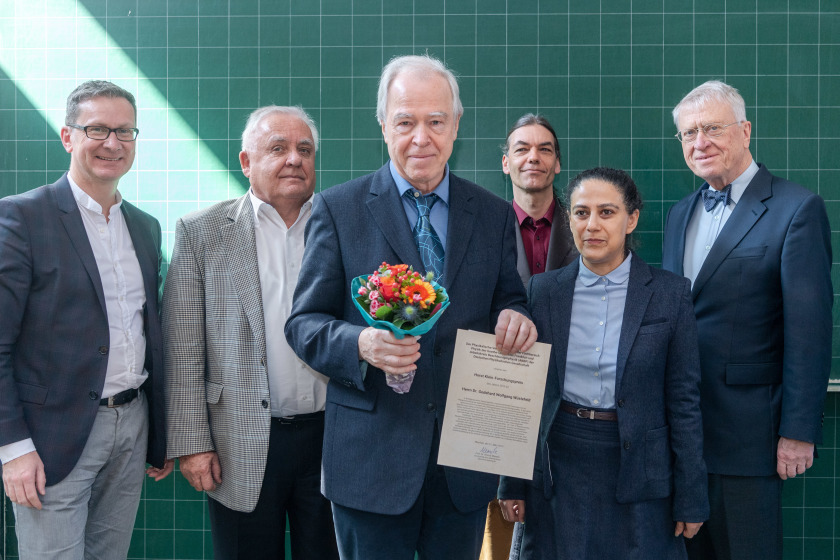Godehard Wüstefeld receives the Horst Klein Research Prize

Dr. Godehard Wüstefeld was awarded the Horst Klein Research Prize.
© DPG

The prize was awarded on 21 March 2019 at the Spring Conference of the Deutsche Physikalische Gesellschaft by the Physikalischer Verein Frankfurt, the Department of Physics of the Goethe University Frankfurt and the Arbeitskreis Beschleunigerphysik (AKBP). © DPG
The physicist Dr. Godehard Wüstefeld was awarded the Horst Klein Research Prize at the annual conference of the German Physical Society. The award recognizes his outstanding scientific achievements in accelerator physics in the development of BESSY II and BESSY VSR.
Over the last thirty years, Dr. Godehard Wüstefeld has made decisive contributions to the further development of storage-ring-based synchrotron radiation sources. Thanks to its innovative concepts, the performance and application areas of storage rings have been consistently expanded. Wüstefeld participated in the development of BESSY II and the Metrology Light Source and implemented several innovations there.
"Low α" operating mode
For example, he was instrumental in enabling a so-called "Low α" operating mode. In this operating mode, short and intensive electron pulses can be generated in storage rings. The "Low α" operating mode has been implemented at BESSY II and the Metrology Light Source as well as at other national and international synchrotron radiation sources and is now available to a large user community. In addition, this mode produces intense and coherent terahertz radiation, which is extremely useful for certain research questions.
Upgrade BESSY VSR
The upgrade to BESSY VSR, which is now being developed, also goes back to a concept in which Godehard Wüstefeld played a leading role. With BESSY VSR, BESSY II will be expanded into a variable pulse length storage ring in which light pulses of varying duration (1.5 picoseconds or 15 picoseconds) will be generated. This allows users to select the optimum pulse duration for their particular experiment. The concept for a variable pulse length storage ring is one of the world's most outstanding further developments of modern synchrotron radiation sources.
Horst Klein Research Prize
The prize was awarded on 21 March 2019 at the Spring Conference (Matter and Cosmos Section) of the Deutsche Physikalische Gesellschaft in Munich by the Physikalischer Verein Frankfurt, the Department of Physics of the Goethe University Frankfurt and the Arbeitskreis Beschleunigerphysik (AKBP) of the Deutsche Physikalische Gesellschaft. The Horst Klein Research Prize is aimed at internationally renowned scientists from Germany and abroad who have distinguished themselves through outstanding achievements of great significance and originality. The prize, which is intended to commemorate the accelerator physicist Horst Klein, is endowed with 5,000 euros and is awarded by the Goethe University Frankfurt, the Fückstiftung, Professors Schempp and Schmidt-Böcking and Pfeiffer Vacuum.
red.
https://www.helmholtz-berlin.de/pubbin/news_seite?nid=20420;sprache=en
- Copy link
-
What Zinc concentration in teeth reveals
Teeth are composites of mineral and protein, with a bulk of bony dentin that is highly porous. This structure is allows teeth to be both strong and sensitive. Besides calcium and phosphate, teeth contain trace elements such as zinc. Using complementary microscopy imaging techniques, a team from Charité Berlin, TU Berlin and HZB has quantified the distribution of natural zinc along and across teeth in 3 dimensions. The team found that, as porosity in dentine increases towards the pulp, zinc concentration increases 5~10 fold. These results help to understand the influence of widely-used zinc-containing biomaterials (e.g. filling) and could inspire improvements in dental medicine.
-
Fascinating archaeological find becomes a source of knowledge
The Bavarian State Office for the Preservation of Historical Monuments (BLfD) has sent a rare artefact from the Middle Bronze Age to Berlin for examination using cutting-edge, non-destructive methods. It is a 3,400-year-old bronze sword, unearthed during archaeological excavations in Nördlingen, Swabia, in 2023. Experts have been able to determine how the hilt and blade are connected, as well as how the rare and well-preserved decorations on the pommel were made. This has provided valuable insight into the craft techniques employed in southern Germany during the Bronze Age. The BLfD used 3D computed tomography and X-ray diffraction to analyse internal stresses at the Helmholtz-Zentrum Berlin (HZB), as well as X-ray fluorescence spectroscopy at a BESSY II beamline supervised by the Bundesanstalt für Materialforschung und -prüfung (BAM).
-
Element cobalt exhibits surprising properties
The element cobalt is considered a typical ferromagnet with no further secrets. However, an international team led by HZB researcher Dr. Jaime Sánchez-Barriga has now uncovered complex topological features in its electronic structure. Spin-resolved measurements of the band structure (spin-ARPES) at BESSY II revealed entangled energy bands that cross each other along extended paths in specific crystallographic directions, even at room temperature. As a result, cobalt can be considered as a highly tunable and unexpectedly rich topological platform, opening new perspectives for exploiting magnetic topological states in future information technologies.
